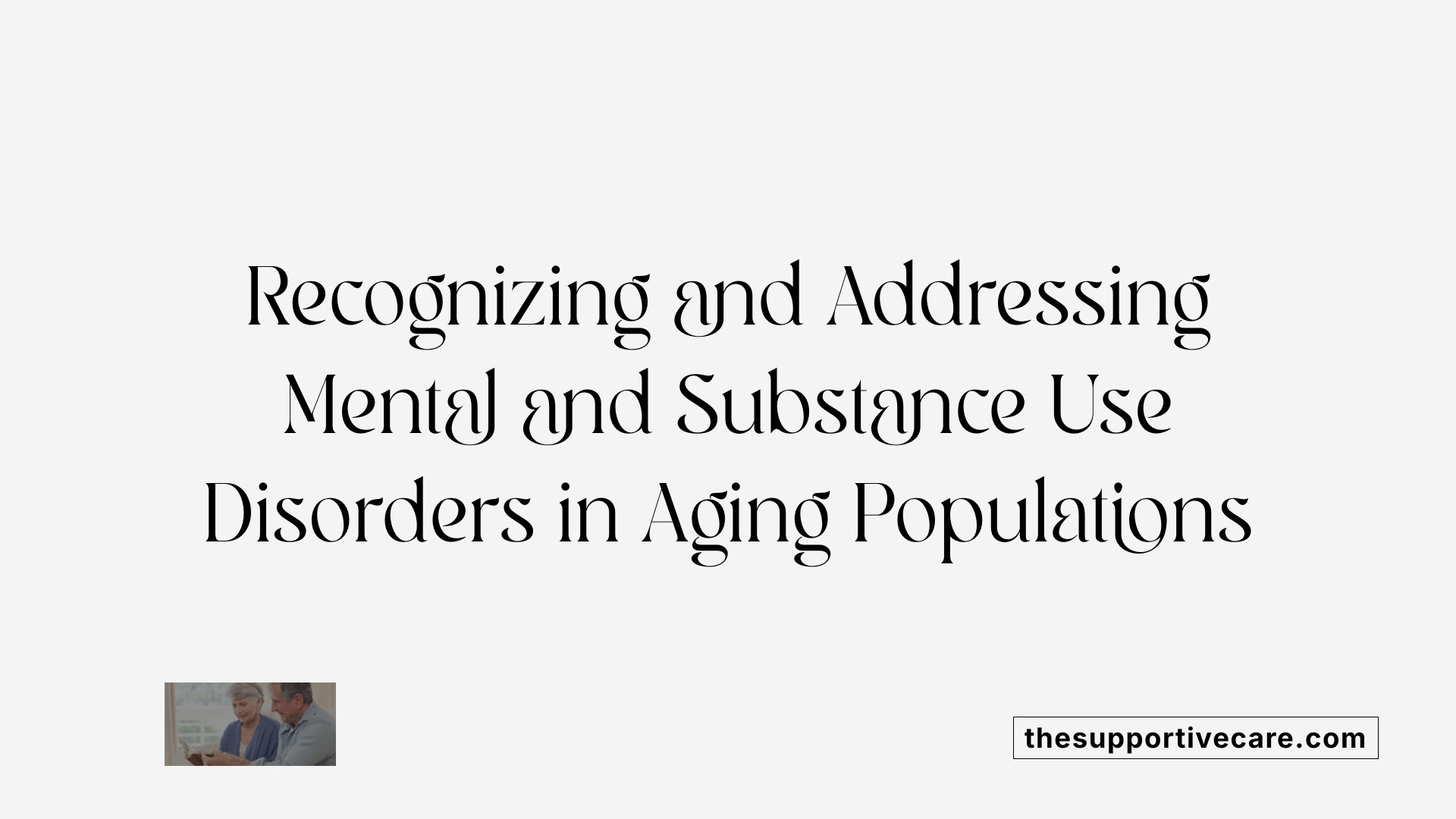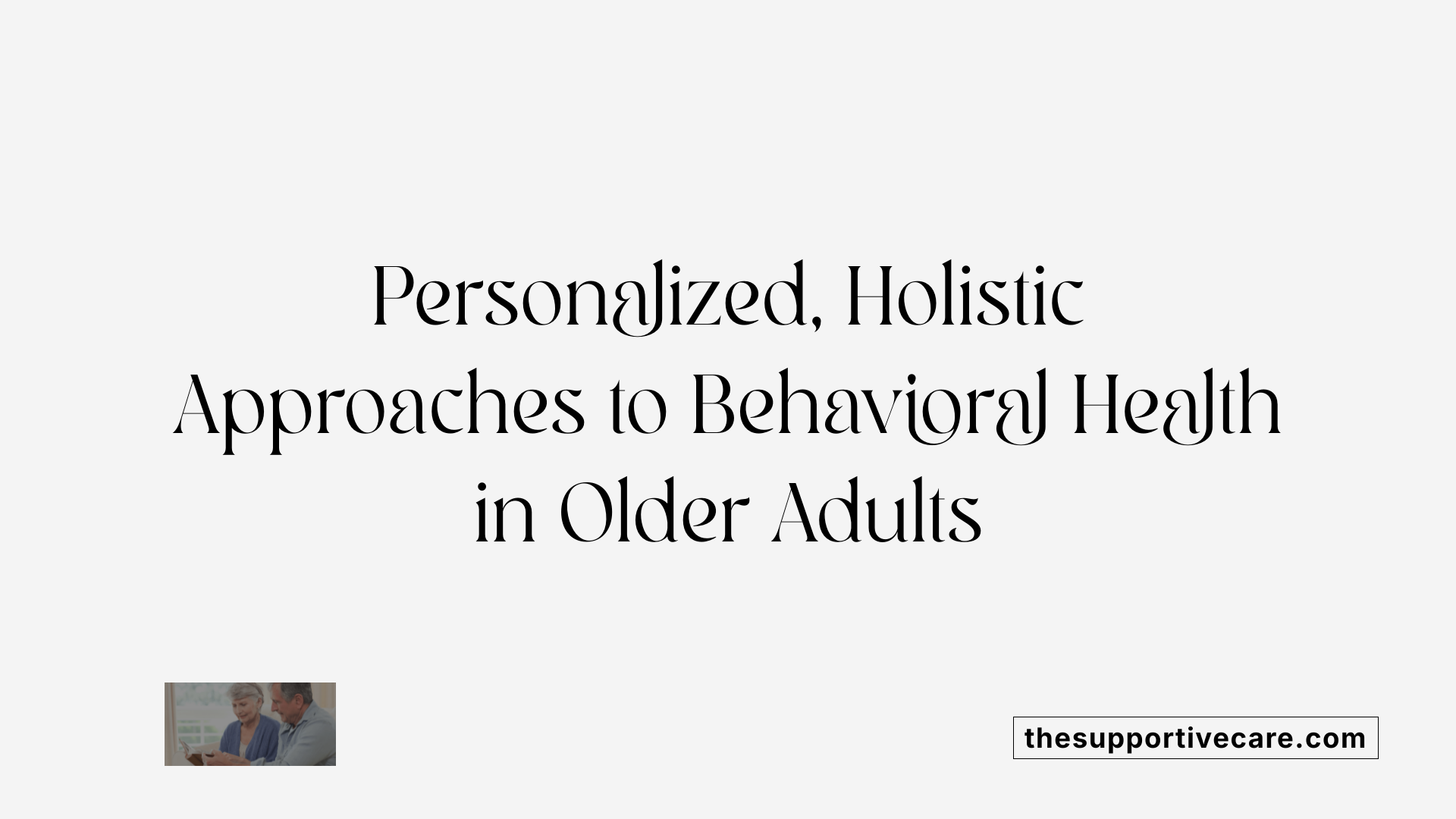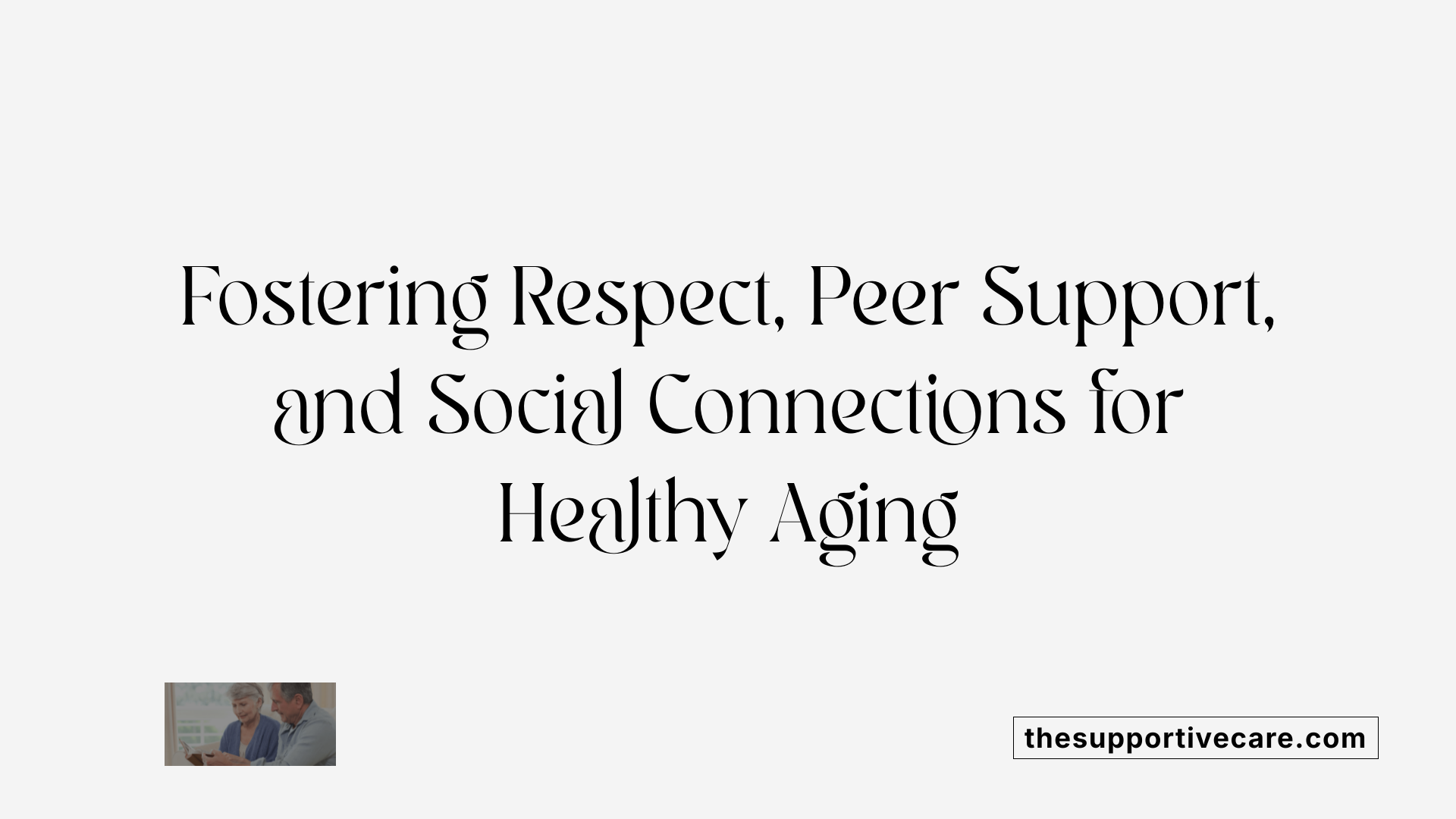Addressing the Growing Behavioral Health Needs of Older Adults
As the global population ages, an increasing number of older adults are encountering complex behavioral health challenges, including mental health disorders and substance use issues. Creating a safe and supportive environment tailored to these seniors' unique needs is crucial. This article explores comprehensive, evidence-based strategies and services designed to enhance recovery, promote wellness, and ensure dignity for seniors with behavioral health concerns.
Understanding Behavioral Health Challenges in Older Adults

How common are mental health and substance use disorders among older adults?
Mental health issues affect approximately 20% of older adults, with depression and anxiety being the most prevalent conditions. Substance use problems affect about 8-10% of this population, and startlingly, nearly 50% of older veterans may experience co-occurring mental health and substance use disorders. Globally, around 14% of adults aged 60 and older live with a mental disorder. These conditions contribute substantially to disability, accounting for over 10% of the total disability-adjusted life years (DALYs) in this age group. Notably, older adults face a high risk for suicide, with about a quarter of all suicide deaths occurring in people aged 60 or above.
What impact do social isolation and abuse have on seniors' mental health?
Loneliness and social isolation are critical risk factors for mental health conditions in older adults, influencing roughly one in four seniors. These factors intensify feelings of sadness and helplessness, making this group more vulnerable to depression, anxiety, and substance misuse. Additionally, elder abuse—affecting one in six older individuals, often perpetrated by caregivers—can precipitate or worsen mental health challenges.
What unique physical and cognitive challenges affect behavioral health in aging populations?
Older adults encounter physical and cognitive challenges that complicate behavioral health management. Conditions like chronic pain and illness contribute to anxiety and depression. The body's decreased ability to metabolize substances heightens sensitivity to drugs and alcohol, increasing the risk of adverse outcomes. Cognitive declines may also impair decision-making and coping skills, requiring tailored treatment approaches that address these complex needs comprehensively.
The Importance of Integrated and Person-Centered Care for Seniors

What Are Integrated Care Models Combining Mental Health and Addiction Services?
Integrated care models provide a unified approach to treating mental health and substance use disorders in older adults. These models address the interconnected nature of these conditions with coordinated services that streamline care delivery. This holistic approach ensures all aspects of an individual's health—physical, mental, and behavioral—are managed together, enhancing treatment effectiveness.
How Do Person-Centered Treatment Approaches Work for Older Adults?
Person-centered treatment focuses on tailoring care plans to the unique needs, preferences, and goals of each senior. It respects cultural backgrounds and personal histories, ensuring interventions align with what matters most to the individual. This approach supports aging adults in achieving meaningful recovery by accounting for their medical history, lifestyle, and social determinants of health.
What Role Do Multidisciplinary Teams Play in Serving Seniors?
Multidisciplinary treatment teams bring together specialists such as psychiatrists, psychologists, addiction counselors, social workers, and primary care physicians. Collaboratively, they develop comprehensive treatment plans addressing co-occurring mental health and substance use disorders. Their combined expertise fosters better assessment, coordinated interventions, and ongoing support tailored to seniors’ complex health challenges.
Together, these integrated and person-centered care methods empower older adults with behavioral health issues to receive compassionate, effective, and coordinated treatment that respects their individuality and promotes long-term recovery.
Evidence-Based Treatments and Support Services for Older Adults
What are effective therapies for older adults with behavioral health needs?
Cognitive Behavioral Therapy (CBT) is widely used to treat mental health issues and substance use disorders in older adults; it helps individuals identify and change negative thought patterns. Medication-assisted treatment (MAT) combines medications with counseling and behavioral therapies to effectively treat substance use disorders. Motivational Interviewing (MI) supports older adults by enhancing their motivation to change substance use behaviors through a collaborative and person-centered approach.
What supportive services improve recovery outcomes for older adults?
Supportive services play a vital role in improving access to treatment and enhancing long-term recovery. Case management helps coordinate care across various healthcare providers and addresses social determinants of health impacting older adults. Peer support programs provide encouragement and reduce stigma by connecting individuals who share similar experiences. Transportation services help overcome mobility barriers, ensuring older adults can attend appointments and participate in treatment activities.
Which specialized programs target the behavioral health of older adults?
Several evidence-based community programs are designed to address mental health and substance use in seniors:
- Healthy IDEAS: Focuses on depression self-management by providing screening, education, and behavioral activation to reduce symptoms.
- PEARLS: A home-based intervention that empowers older adults to reduce depression through brief behavioral techniques.
- SBIRT (Screening, Brief Intervention, and Referral to Treatment): Early identification and intervention for substance use concerns, including alcohol and prescription drugs.
- WRAP (Wellness Recovery Action Plan): A group-based program that helps participants develop personalized wellness strategies to manage behavioral health.
These programs promote holistic and person-centered care tailored to aging adults, aiming to improve quality of life and support sustained recovery.
The Role of Case Management in Behavioral Health Recovery for Seniors

What are the core principles of case management in behavioral health for older adults?
Case management for seniors with behavioral health challenges emphasizes patient-centered care, ensuring that treatment plans reflect individual preferences, cultural backgrounds, and goals. A vital aspect is addressing social determinants of health — such as housing, social support, and access to resources — which greatly influence recovery outcomes. Advocacy and shared decision-making empower seniors to actively participate in their treatment journey, fostering better engagement and satisfaction.
How does case management coordinate care and support recovery skills?
Case managers serve as a single point of contact to coordinate services across multiple healthcare and social agencies, including mental health providers, addiction specialists, and community organizations. Beyond managing appointments and referrals, they often teach recovery skills such as assertive communication and community living capabilities. This holistic approach not only streamlines care but also equips older adults with practical tools to maintain sobriety and enhance overall functioning.
What impact does case management have on treatment adherence and health outcomes for older adults?
Research demonstrates that case management leads to improved treatment adherence among seniors, helping them stay engaged in behavioral health programs. Meta-analyses show statistically significant benefits including reductions in substance use, enhanced family relationships, and decreased legal issues. Additionally, case management reduces acute care episodes and encourages use of nonacute services, contributing to better health status and long-term recovery stability for older adults.
Creating Stigma-Free and Supportive Environments

What are the challenges of stigma and social isolation in seniors with behavioral health disorders?
Older adults with behavioral health issues, including mental health conditions and substance use disorders, often face significant stigma that deters them from seeking help. Many may have lived with addiction or mental illness in secrecy for decades, exacerbating feelings of shame and isolation. Social isolation, a prevalent issue among seniors, intensifies feelings of sadness, helplessness, and vulnerability to depression and anxiety. Approximately 20% of older adults experience mental health problems, and social isolation affects about a quarter of this population, contributing profoundly to mental health decline.
How do peer support programs and community engagement help?
Peer support programs provide crucial stigma-free environments where older adults feel understood and supported by others with similar experiences. These programs encourage open sharing and reduce feelings of isolation. Community engagement initiatives foster social connections, improve emotional well-being, and increase access to treatment and recovery resources. Programs like those offered by Odyssey House emphasize peer support and community involvement, enhancing recovery outcomes for seniors by addressing both emotional needs and social determinants of health.
What strategies help combat ageism, abuse, and discrimination?
Combatting ageism and abuse requires comprehensive approaches, including anti-discrimination policies, education to raise awareness about seniors' behavioral health needs, and promoting intergenerational activities that foster respect between age groups. Protection measures also include recognizing and addressing elder abuse, which affects about one in six older adults and often leads to depression and anxiety. Creating supportive environments that encourage healthy aging and incorporating culturally sensitive care further help reduce stigma and promote dignity. Together, these strategies cultivate safe spaces where older adults feel valued and empowered to pursue treatment and recovery.
Addressing Social Determinants and Community-Based Strategies

How do housing, employment, and education impact behavioral health?
Housing stability, employment opportunities, and education access are crucial social determinants that significantly influence behavioral health outcomes. Secure housing provides a safe environment that reduces stress and supports recovery, while stable employment fosters purpose, social engagement, and economic security. Education enhances health literacy, empowering individuals to make informed decisions and access care effectively. Challenges in these areas can increase vulnerability to mental health disorders and substance use among older adults.
What community-wide initiatives promote awareness and safe environments for behavioral health?
Communities implement various initiatives to improve behavioral health, such as awareness campaigns that educate about mental health and substance use, reducing stigma and encouraging treatment seeking. Programs fostering social support and community engagement help combat loneliness and social isolation, which are major risk factors for behavioral health problems.
Efforts also focus on creating safer environments through violence prevention, anti-discrimination policies, and intergenerational activities that build inclusion and protective social networks. Community organizations often provide culturally appropriate services, peer support groups, and accessible resources that enhance resilience and recovery.
What policy proposals emphasize prevention, early intervention, and integrated services?
Emerging policy proposals advocate transforming the behavioral health system to prioritize prevention and early intervention by meeting individuals where they are. This includes decriminalizing mental health and substance use disorders and investing in social determinants such as housing, education, and employment to address root causes.
Policies further support integrated care models combining mental health, addiction, and primary services to ensure holistic treatment. Expanding community-based programs and workforce training underpins these strategies, alongside strengthening data systems for outcome measurement and quality improvement.
These approaches aim to reduce unmet needs, enhance recovery rates, and promote equity in behavioral health outcomes, particularly for older adults and vulnerable populations.
Preparing for the Future: Meeting the Rising Demand for Specialized Senior Care
How are demographic trends affecting the demand for specialized treatment?
The global population is aging rapidly, with projections indicating that by 2030, one in six people worldwide will be aged 60 or older. This demographic shift drives an increased need for specialized behavioral health services tailored to older adults. Approximately 14% of this age group live with a mental disorder, while up to 10% struggle with substance use problems. Co-occurring mental health and substance use disorders are common, especially among older veterans. Social isolation and age-related physical and cognitive challenges further complicate treatment needs.
What programs provide tailored care for older adults?
Specialized treatment programs like Odyssey House have developed comprehensive residential and outpatient services specifically for older adults with substance use disorders. Their approach includes individualized treatment plans using evidence-based therapies such as Cognitive Behavioral Therapy (CBT) and trauma-informed care, medication-assisted treatment (MAT), and onsite medical and dental clinics. Additional support includes physical fitness, art and recreational activities, education, job training, housing aid, and ongoing outpatient counseling. An important feature is a stigma-free environment emphasized through peer support, which is vital for older adults who may have endured long-term addiction with secrecy.
What reforms are needed to enhance care delivery for this population?
Addressing the growing demand requires financial investment and healthcare system reforms. Expanding and training a workforce skilled in geriatric behavioral health is essential. Healthcare models must integrate services for mental health, substance use, and physical comorbidities to deliver holistic care. Financing structures should encourage comprehensive, continuous care rather than episodic treatment. Innovations such as value-based care and health IT can improve coordination and outcomes. Additionally, policies must support accessible, culturally sensitive services with an emphasis on social determinants like housing and social support to achieve sustainable recovery among aging adults.
Building Safe and Effective Support Systems for Seniors with Behavioral Health Issues
Meeting the behavioral health needs of older adults demands comprehensive, coordinated, and compassionate approaches that address physical, mental, and social factors. By integrating evidence-based treatments, robust case management, and stigma-free environments, alongside community and policy initiatives focused on social determinants, we can create safe spaces where seniors thrive in recovery and well-being. Such efforts will play an essential role as the aging population grows, ensuring that older adults receive the dignified care and support they deserve.
References
- COMPREHENSIVE CASE MANAGEMENT FOR ...
- Integrating Mental Health Support and Addiction Treatment ...
- Mental health of older adults
- Treatment Services for Older Adults with Substance Use ...
- Behavioral Health | Live Healthy
- Transforming Mental Health And Addiction Services
- Advancing Behavioral Health Programs for Older Adults



































































































